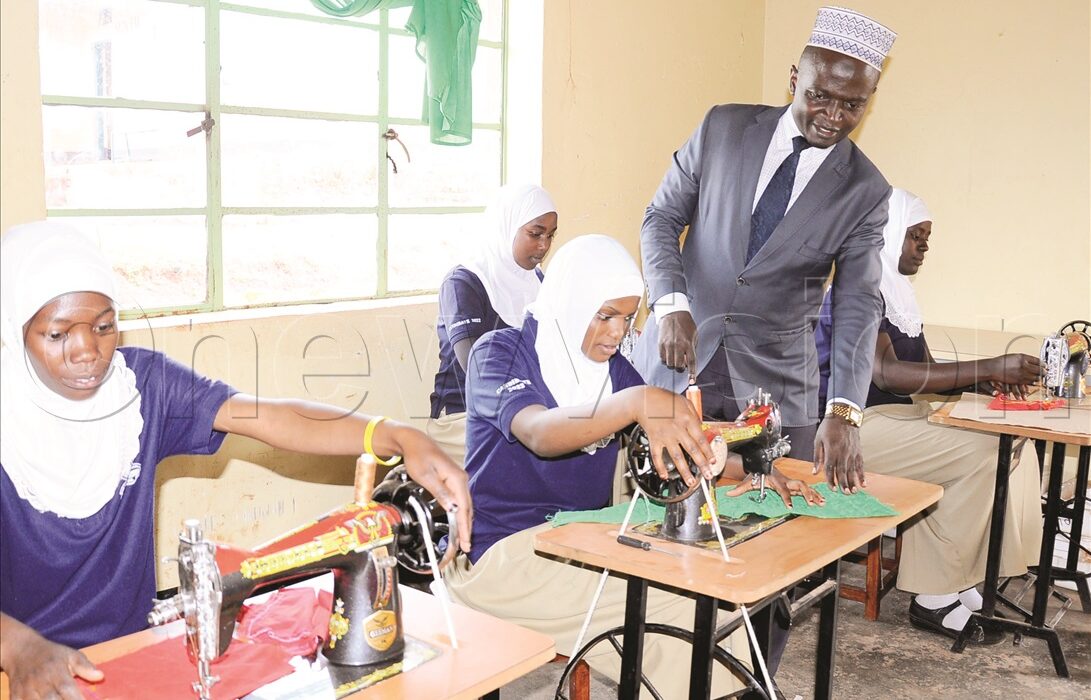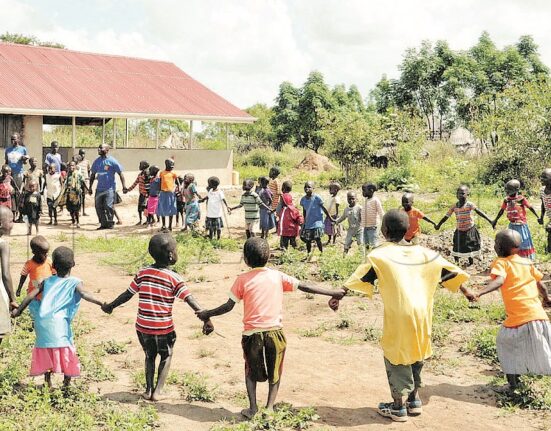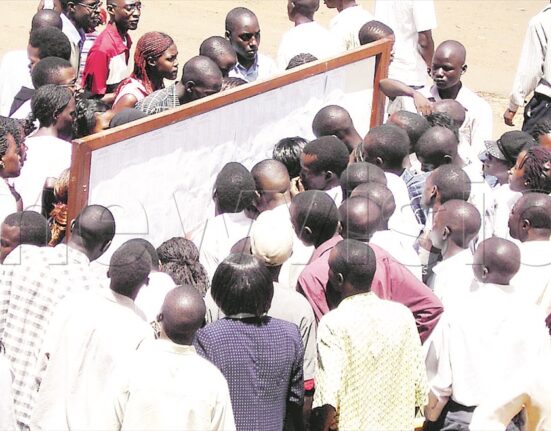(This article was published in the New Vision on July 27, 2022)
By Umar Nsubuga
When Abdul Kabugu was appointed to head Sayidina Abubaker Secondary School in Mpigi district in 2018, the student population had dwindled. Although the student population oscillated between 280 and 350 for several years, by the time Kabugo took over, it had declined to 240.
The biggest number of students who had dropped out of school were girls. Even those girls who were still in school had trouble managing menstruation periods, according to the school. So, Kabugu developed a strategy to help girls manage menstruation cycles.
He mobilised the students to start making sanitary towels using locally available materials such as papyrus and banana fibers, fabrics and sheets of paper.
As the project started bearing fruits, with more girls managing menstruation cycles at school better, the school entered into a competition for Zayed Sustainability Prize in 2020 and was crowned the winner from Sub-Saharan Africa under the global high schools category.
Kabugu says the school has been rewarded with equipment to help it produce more sanitary products.
The prize, which is managed in the United Arab Emirates (UAE), was established in 2008 in honour of its deceased former leader, Sheikh Zayed bin Sultan Al Nahya, in recognition of his role in humanitarian work and sustainability.
It celebrates non-profit organisations, small and medium-sized enterprises and high schools for their impactful, innovative and inspiring sustainable solutions across the health, food, energy, water and global high school categories.
“We are going to start producing sanitary towels for all girls in the school when the equipment arrives from the UAE. When we entered the competition, we submitted a proposal for making more pads and showed what we were doing to keep girls in school by giving them sanitary towels,” Kabugu explains.
He says the sanitary towels project is part of a wider scheme of skilling students that he launched in 2018. The scheme requires every student to learn at least one vocational skill.
Kabugu says he introduced the vocational scheme after learning that many students were completing the secondary school cycle without skills.
“I made vocational training compulsory and at least now every student comes out of our school with a skill. We are running practical courses in tailoring, hairdressing, leather tanning, shoe-making, sanitary pads making and bakery,” he says.
According to school records, the student population has now increased to 1,151.
Kabugu attributes this partly to the free sanitary products supplied to girls and his skilling project, which is equipping students with hands-on skills. This, he adds, has improved the students’ understanding of the value of education.
He explains that he secured a partnership with the Directorate of Industrial Training, which assesses and awards certificates to students after completing O’level. Close to 300 students have so far been assessed and given these certificates, according to Kabugu.
“I hope that this project helps students to be self-reliant, whether they choose to continue with studies or not after completing high school. The unemployment rate is high and one needs hands-on skills to survive because an academic qualification is no longer enough,” Kabugu notes.

Academic Performance
Two years after his appointment as the headteacher, the school which had never had two students passing in the first division at O’level had two in 2015, six in 2016, 12 in 2017, 18 in 2018, 19 in 2019 and 32 in 2020. In terms of A’level, 68 candidates out of 71 passed with three principal passes in 2020.
Kabugu attributes the improvement to a system he introduced a few years ago, requiring teachers to assess the students’ understanding of each topic before introducing another. This allows the teacher to fill gaps in the students’ knowledge.
“To achieve this, our students do tests daily, in the morning and evening. These tests are well planned and timetabled. Both the teachers and students are aware of them and prepare for them,” Kamimo Masakwa, the school’s director of studies, explains.
In order to further improve the learning environment, in 2018, Kabugu lobbied the Government to build eight classrooms. With school funds, Kabugu has also constructed a new dormitory for female students and a perimeter wall around the school to improve security. He also constructed a borehole and a water pump in 2018 which have improved water security.
“Before, students used to fetch water outside the school premises, which was inconveniencing them. The learners would also lose time as they moved between the school and the water source in the community,” Kabugu adds.
The headteacher has also built 16 housing units for teachers at the school and paved the walkways around the institution.
Kabugu says he mobilises students and facilitates students to take part in co-curricular activities by purchasing equipment for sports and drama.
Over the course of a two-year COVID-19 induced lockdown, Kabugu explains that he mobilised the teachers to set up online classes, but these did not take off as the students did not have digital tools, such as smartphones and computers.
When schools reopened, Kabugu and his team put in place handwashing facilities and encouraged students to wear masks as they mobilised parents to send their children back to school. This, the headteacher says, could have prevented the learners from contracting the virus.
Fact file

- 1991: Completed primary at Namataba Primary School
- 1995: Did O’level at Kawempe Muslim Secondary School
- 1997: Finished A’level at Kawempe Muslim Secondary School
- 2001: Graduated with a Bachelor of Science degree in education from Makerere University
- 2001-2004: Teacher at East High School Ntinda and Highland Secondary School
- 2004: Teacher at Sayidina Abubaker Secondary School
- 2006: Earned a master’s degree in education management from the Islamic University in Uganda
- 2010: Deputy headteacher, Sayidina Abubaker Secondary School
- 2013: Acting headteacher, Sayidina Abubaker Secondary School
- 2018 to date: Headteacher, Sayidina Abubaker Secondary School
Others Speak
Sulaiman Sseninde, parent:
Kabugu is approachable and development-oriented. He has used the available resources to transform the school.
Younous Kamulegeya, chairperson board of directors:
Kabugu is guiding the school in the right direction and we are giving him all our support. He has transformed it from a struggling school in a village to one of the best in the district.
Kamimo Masakwa, dean of studies:
We have witnessed progressive improvement in academics over the years Kabugu has been leading the school. We have more students passing in top grades. He has encouraged us to benchmark against other schools and attend continuous training through workshops and refresher courses.
Sowadi Higenyi, deputy headteacher
Kabugu has created a conducive learning environment for students which has increased the student population. He has also improved the school’s infrastructure and teachers’ accommodation. It is his frugality that has enabled him to do all this.









Leave feedback about this